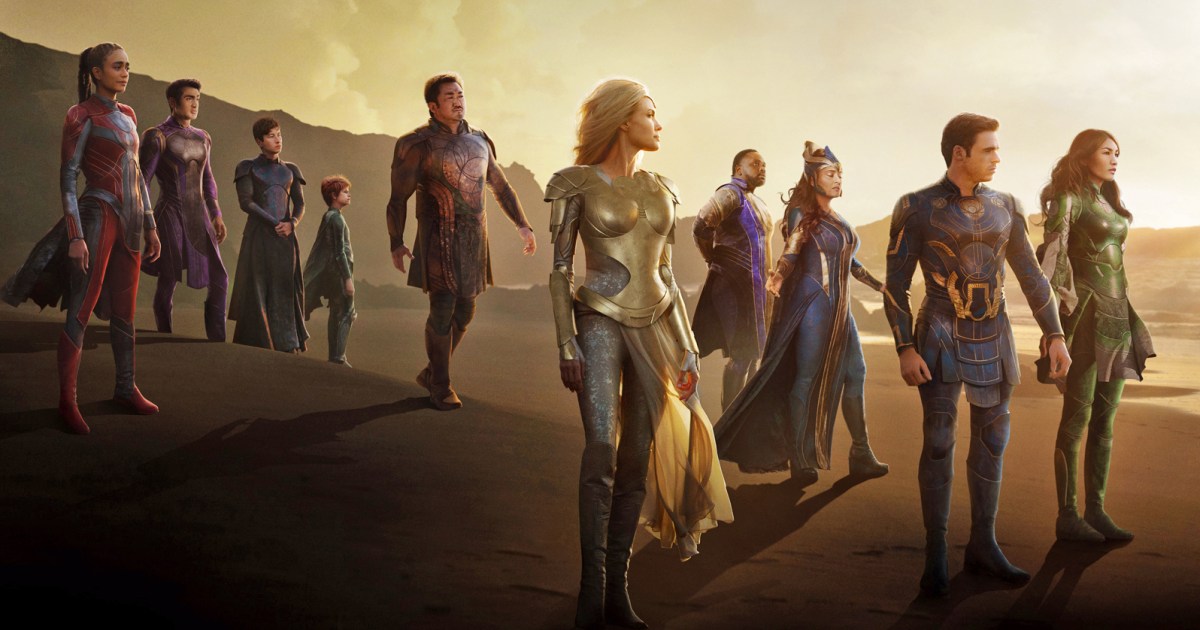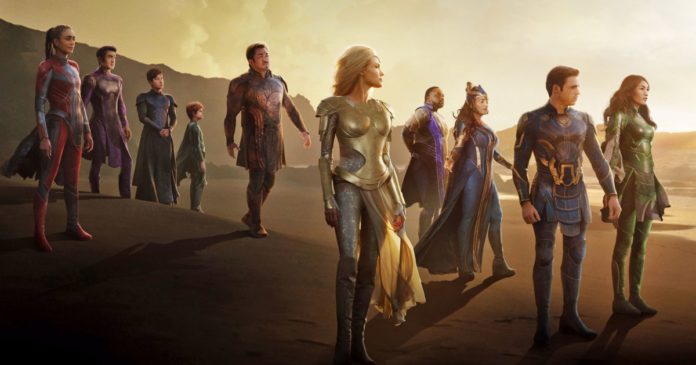
LOS ANGELES – When “Eternals,” the first movie in the Marvel Cinematic Universe featuring a gay superhero, rolls out in the Arab world on Thursday, the Disney-distributed blockbuster will, unsurprisingly, skip releases in Saudi Arabia, Kuwait, Qatar, Bahrain and Oman, mainly due to its LGBTQ content.
But the star-studded superhero pic will still screen for audiences in the United Arab Emirates, Egypt, Lebanon, Iraq, Jordan, Ethiopia, Palestine, Syria and Turkey. This, in itself, is something of a breakthrough for the region: Excising the same-sex kiss between gay superhero Phastos (played by Brian Tyree Henry) and his husband Ben (Haaz Sleiman), doesn’t remove the fact that the “Eternals” version being screened in movie theaters in a large swathe of the Middle East will still feature the two men, who are married with a child.
Disney, which has declined to comment, is understood to have been unwilling to accommodate requests for different cuts made by various censorship boards in several Middle East nations — something they’ve been willing to do on past films. It doesn’t mean they didn’t chop anything out of “Eternals” for the Middle East; it’s just that, this time, Disney was willing to make only one version of “Eternals” that would be acceptable across the Arab world, according to sources.
In the “Eternals” cut that will play in parts of the Middle East, all scenes of intimacy — both gay and straight — have been cut, which is standard for these markets. But it will still be obvious that Phastos and Ben share a child together.
This is an aspect of “Eternals” that director Chloe Zhao has said in several interviews was already an integral part of Marvel Studios’ conception of these characters when she first began discussing the film with the studio. The “Nomadland” director told IndieWire that she asked Marvel not to alter any scenes to appease censors.
Sleiman, who was raised in a Muslim family in Lebanon before moving to the U.S., where he came out as gay in 2017, has praised Disney for taking a harder stand against Middle East censorship this time. “They stood their ground and said, ‘Nope, we are not going to compromise the integrity of our film,'” Sleiman told Variety in an interview last week. “It made these Arab countries looks so ignorant and pathetic.”
Interestingly, the censorship board in the UAE is believed to have been open-minded, and asked for only a very minor cut.
And while the LGBTQ issue was common to all Middle East markets where “Eternals” won’t be released, censors in Kuwait and Qatar had also requested additional edits owing only to a problem they had with the godlike character of Arishem, the Prime Celestial in the film, since in the Muslim world, on-screen portrayal of gods and prophets is generally considered blasphemous.
Prominent Middle East multiplex chain Vox Cinemas, which is playing “Eternals” in the UAE, Lebanon and Egypt, did not comment on the cuts, beyond a terse statement saying that “as an exhibitor we follow regulators’ guidance on a market by market basis.”
Of course, the issue of film censorship in the region due to a range of reasons including depictions of violence, immortality and overall intimacy — not just same sex — is not specific to “Eternals.” Other movies that have been banned in the Middle East for religious reasons include Ridley Scott’s 2014 retelling of the story of Moses, “Exodus,” and Darren Aronofsky’s “Noah.”
More recently, the first same-sex kiss ever in a “Star Wars” movie, between Commander D’Acy (Amanda Lawrence), a minor supporting character, and another woman in the Resistance in “Star Wars: The Rise of Skywalker” was chopped out in the UAE and across the Middle East in 2019.
Similarly Disney/Pixar family film “Onward” was banned in Saudi Arabia, Qatar, Kuwait and Oman in 2020 due to the film’s passing reference to a lesbian relationship. And earlier this year, Disney’s “Cruella” was not granted a release certificate in Qatar since the local censorship board identified the Artie character as LGBTQ and wanted him removed from film, which instead played in other Middle East territories.
Openly gay, lesbian and transgender people face persecution across most of the Arab world where same-sex relations are against the law. In Saudi Arabia, homosexuality can be punished by flogging or death. Several industry experts and academics in the region declined to comment for this article, given the sensitive nature of the issue.
“Every country is free to make their own decision in regards to what content it considers culturally appropriate,” said Cairo Film Festival President Mohamed Hefzy, who is a prominent Egyptian film and TV producer.
“That said, I am glad ‘Eternals’ is screening in Egypt, and that Egypt is not one of the countries that is stopping the screening of the film,” he added, noting he was also “happy that the film is playing without too many cuts.”
As for whether “Eternals” will move the needle, Hefzy added: “It’s hard to speculate whether it’s a trend that’s going to continue in terms of more openness to gay themes” or whether it is, instead, “just a one-off.”








